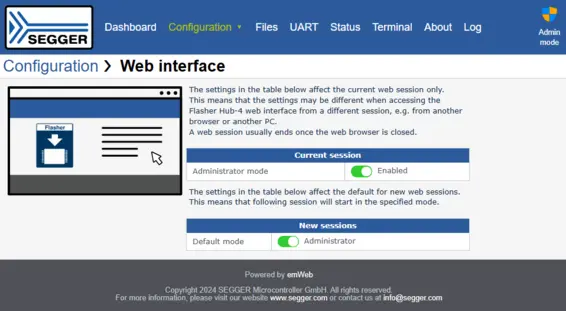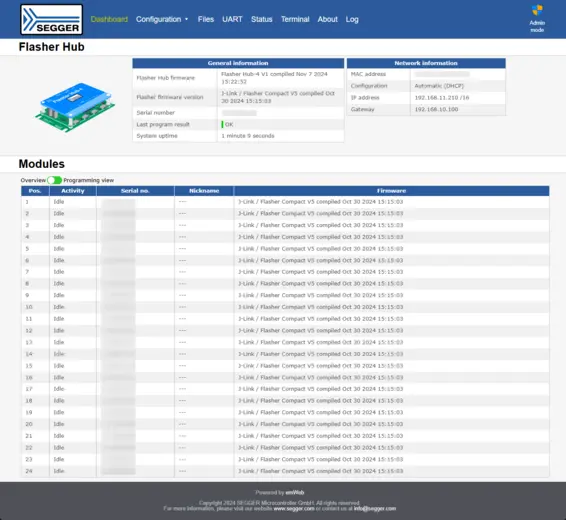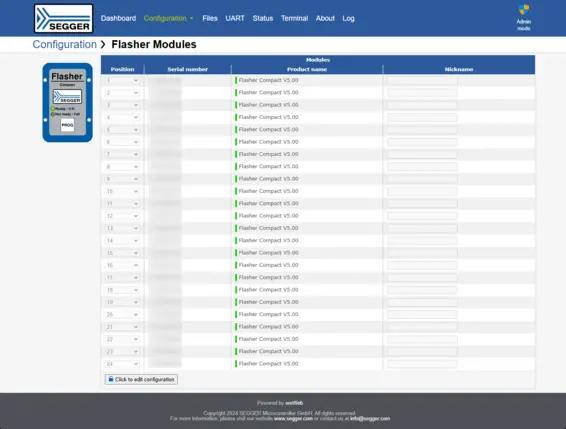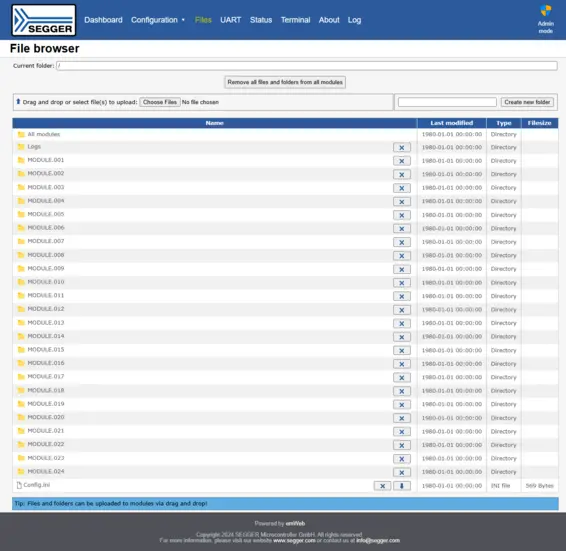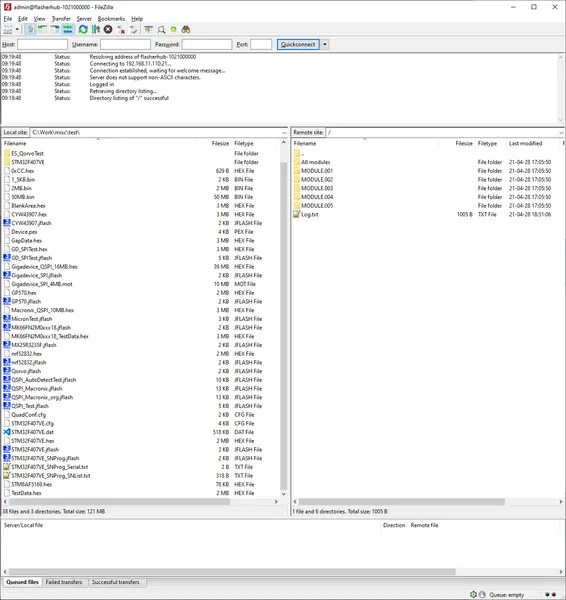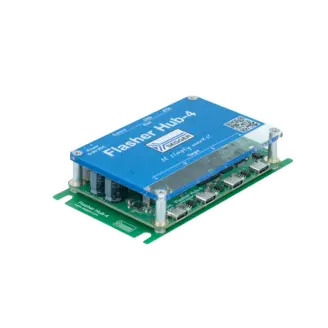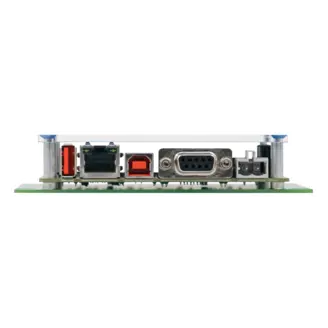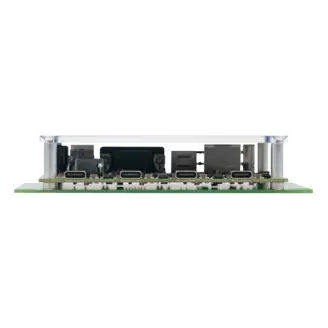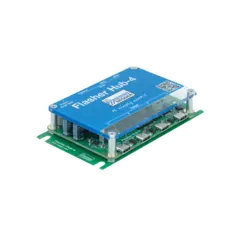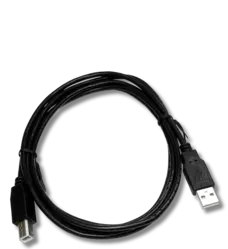Flasher Hub-4
Compact high-volume production programming
As the compact version of the Flasher Hub-12, the Flasher Hub-4 controls multiple Flasher Compacts so that they program simultaneously. Up to 24 Flashers can be connected using one or multiple SEGGER USB Hubs to create a powerful gang programmer for efficient high-volume parallel programming.
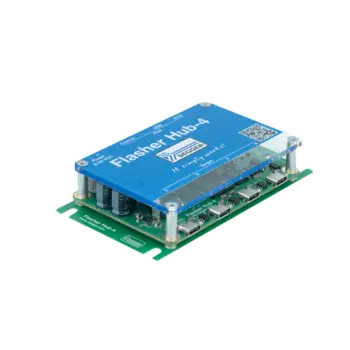
Overview
SEGGER’s Flasher Hub-4 controls multiple Flasher Compact units serving as individual channels for parallel, high-speed gang programming. Each channel can be configured to program a different device or a different firmware image.
The Flasher Hub-4/Flasher Compact system is set up just once per channel using SEGGER's Flasher software package. The software depends on the type of flash chip being programmed. The Flasher Hub-4 can receive commands and send results "stand-alone" via TELNET, a desktop PC is not required for control.
Using a single Flasher Hub-4 and multiple Flasher Compacts is the perfect solution for high-volume multi-panel and multi-target mass production.
Key features
- Scalability
- Direct Mode: Up to 4 individual parallel programming channels with their own circuit memory (no USB hubs required)
- Flex Mode: Up to 24 individual parallel programming channels with their own circuit memory (via external USB hubs)
- Reliability
- Longevity
- Built-in web & FTP server for easy setup
- Multi-platform: Includes application software for Linux, macOS, and Windows
- No license required. No hidden costs. No future costs.
- Future proof: Software, firmware updates as well as new flash loaders are free of charge.
Supported devices
SEGGER Flashers support a wide range of CPU cores and an even wider range of different devices, such as SPI-Flash devices.
This includes support for tens of thousands of devices in hundreds of device families with billions of devices programmed.
Please note that a device may still be supported even if it is not on the list. Device not listed? Please don’t hesitate to contact us.

Universal target support
The Flasher Hub-4 supports all flash devices and programming interfaces supported by the Flasher Compacts that are connected to it. By using Flasher Compact as modules, the Flasher Hub-4 takes advantage of the extensive list of supported devices and target interfaces, plus the ultra-fast programming speed and reliability, of these almost-anything-programmers.
Software
All software is included free of charge. It comes with the flash loaders for all supported devices.
For the Flasher Hub-4, the Flasher Software and Documentation Package is available:
Updates
Future software and firmware updates as well as any new flash loaders for target devices that will be added, are also free of charge.
- No licensing costs, even for newly added devices.
- No hidden costs.
- No future costs.
Multi-platform
As a multi-platform solution, the Flasher Hub-4 comes with the application software for Linux, macOS, and Windows. Software and firmware updates are included. Similarly, use on all currently supported target devices, and any that will be added, is also included.
Parallel programming
The Flasher Hub-4 controls multiple Flasher Compacts. In Direct Mode, a single Flasher Hub-4 supports up to four Flasher Compacts. In Flex Mode, using one or multiple SEGGER USB Hubs enables the administration and control of up to 24 programming channels. Each Flasher Compact can be configured individually to program different targets with different target firmware simultaneously.
Whether it’s the number of channels, type of flash device, firmware image, programming interface or command interface, the Flasher Hub-4 can manage them all.

Flexible control and monitoring
The Flasher Hub-4 is easy to set up. It can be operated via TELNET or RS232 using the built-in ASCII command interface which was designed for automation. The Flasher Hub-4 also comes with a web interface designed for easy and intuitive manual operation.
Operating modes
The Flasher Hub-4 offers two different modes: Direct Mode and Flex Mode.
Direct Mode
In Direct Mode, each connected Flasher Compact module is assigned a position corresponding to its USB port. This mode enables seamless integration of up to four modules.


Flex Mode
In Flex Mode, it is possible to connect more than four modules to a Flasher Hub-4. This can be achieved by connecting SEGGER USB Hubs to a Flasher Hub-4. This way, users can flexibly assign a module position to a Flasher Compact. With the capability to connect up to 24 Flasher Compact modules, the Flasher Hub-4 provides a highly scalable gang programming solution.
Please note:
- For optimal operation, we recommend using the SEGGER USB Hub. Although most third-party USB hubs will work in this combination, we can only provide support for SEGGER USB Hubs.
- If you need a lot of parallel programming channels, also be sure to take a look at the Flasher Hub-12.
Serial number assignment
Many modern devices require some pieces of unique information.
The Flasher Hub-4 allows the programming of data that differs amongst other otherwise identical units. Typical examples are things like serial numbers, ethernet hardware addresses (MAC), and digital signatures, and license keys that enable/disable product features. All these options can be adapted from device to device by applying patch data to the original firmware while programming.
Built-in web server
The built-in web server of the Flasher Hub-4 (using emWeb) simplifies configuration and setup of the programming system. In addition it offers options to check status information remotely and to manage firmware images.
Remote monitoring
The built-in web server is designed to present important device and current operation data for a quick overview and, additionally,to check the status of the programmer, providing information about:
- Installed firmware version
- Hardware version
- Power consumption
- IP configuration
- Network load
- Current operation and status
- Programming interface in use
This may be important for fast troubleshooting through code verification, for instance, as it is when executing a cyclic redundancy check (CRC) that helps to detect errors during data transmission or storage.
Configuration
If needed, the built-in web server programmer settings can be checked and adjusted. These could, for example, be parameters like:
- Subnet mask
- Gateway
File management
The built-in web server enables file management for all connected modules. This includes
- Firmware images
- Setup files
Built-in FTP server
The Flasher Hub-4 also includes the built-in FTP server, to upload firmware and configuration or download log files.
Remote file update
Using the emFTP server enables easy upload of configuration files and firmware images. By connecting to the emFTP server using an FTP client of choice, files can be transferred between client and Flasher.
Having access to the Flasher configuration via FTP enables configuration of multiple Flashers from a central production control server. This interface also can be used to make the production line part of a CI/CD system to push stable releases into the current production.
Log file
Analyzing the reliability of the production line is an important task, when it comes to increasing the production speed and volume. This purpose is supported by the built-in FTP server, which lets users check the history of past programming cycles via log file download. Each entry provides the following information:
- Result (success/failure)
- Duration
- Serial number (if programmed)
For failed programming cycles, the log file provides additional information for quick troubleshooting (e.g. failed to open Flasher config file).
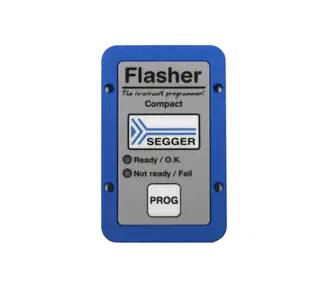
Flasher Compact — The space-efficient programmer
The Flasher Compact is the compact twin to the Flasher PRO, primarily designed for installation into production rigs or automated test equipment (ATE) where production space is limited. Using the Flasher Hub-4, multiple Flasher Compacts can gang-up to program up to 24 targets at once.
Technical specifications
| Specifications | |
|---|---|
| Power supply | 8-30 VDC, reverse polarity protected, max. 30 W [1] |
| Power consumption | Max. 11.5 W [1] |
| USB Flasher interface | USB-C 2.0 |
| Host interfaces | USB Type-B (Upstream), USB Type-A (Downstream), Ethernet, RS232 9-pin |
| Operating temperature | + 5 °C ... + 60 °C |
| Storage temperature | - 20 °C ... + 65 °C |
| Relative humidity (non-condensing) | < 90 % rH |
| Size (without cables) | 125 mm x 78 mm x 25 mm |
| Weight (without cables) | 135 g |
[1] Depends on current consumption of connected downstream devices. For maximum load, the input supply must provide 12 VDC or more.
